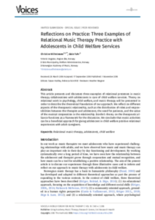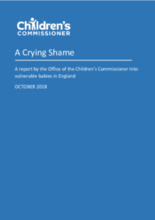

Displaying 961 - 970 of 1647
In this speech given at the launch of a "landmark package of support for young people leaving care," Nadhim Zahawi, the UK's Minister for Children and Families, spoke about a new initiative to increase support for care leavers in the UK.
This study aimed to understand the experience of adoptive parents who have completed dyadic developmental psychotherapy (DDP) therapy.
This article presents and discusses three examples of relational processes in music therapy collaborations with adolescents in care of child welfare services.
The aim of this study was to investigate the degree to which data collection achieves screening aims (identifying scale of problem, impacting on mental health) and the potential analytic value of the dataset.
This report uses local authority data from March 2017 to estimate how many UK children under the age of five are at risk of severe harm, with a particular focus on infants under the age of one.
This study sought to find out the current numbers of autistic Looked-After children formally recorded across local authorities in England, and whether their needs are given special attention via strategic planning and oversight, using Freedom of Information (FoI) requests sent to all local authorities in England.
The UK parliament held a debate on modern slavery and "several British lawmakers said they would call for the legislation to be updated to account for orphanage trafficking," according to this article from Reuters.
This paper examines young people’s experiences of the aftercare planning process in Ireland drawing on data from the first phase of a qualitative longitudinal study of young people leaving care.
Leading the newly established Data, Outcomes & Economics function, the Head of Research Data, Outcomes and Economics will play a crucial role in building Lumos's research capability, designing and implementing new data systems and delivering rigorous insights and evaluation.


